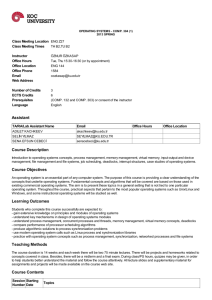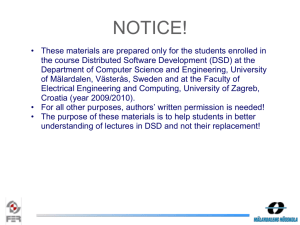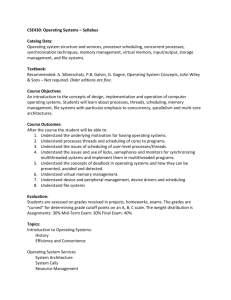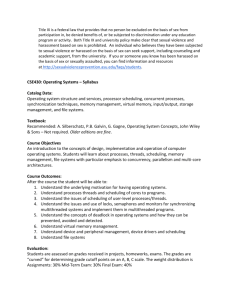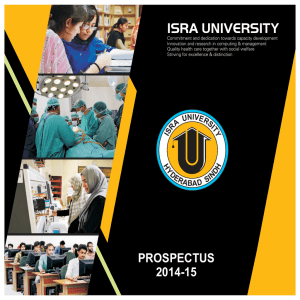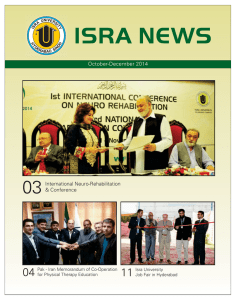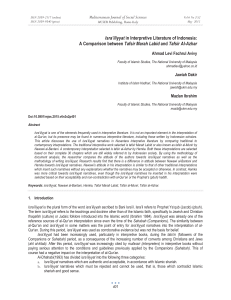CS364_OS - Isra University
advertisement
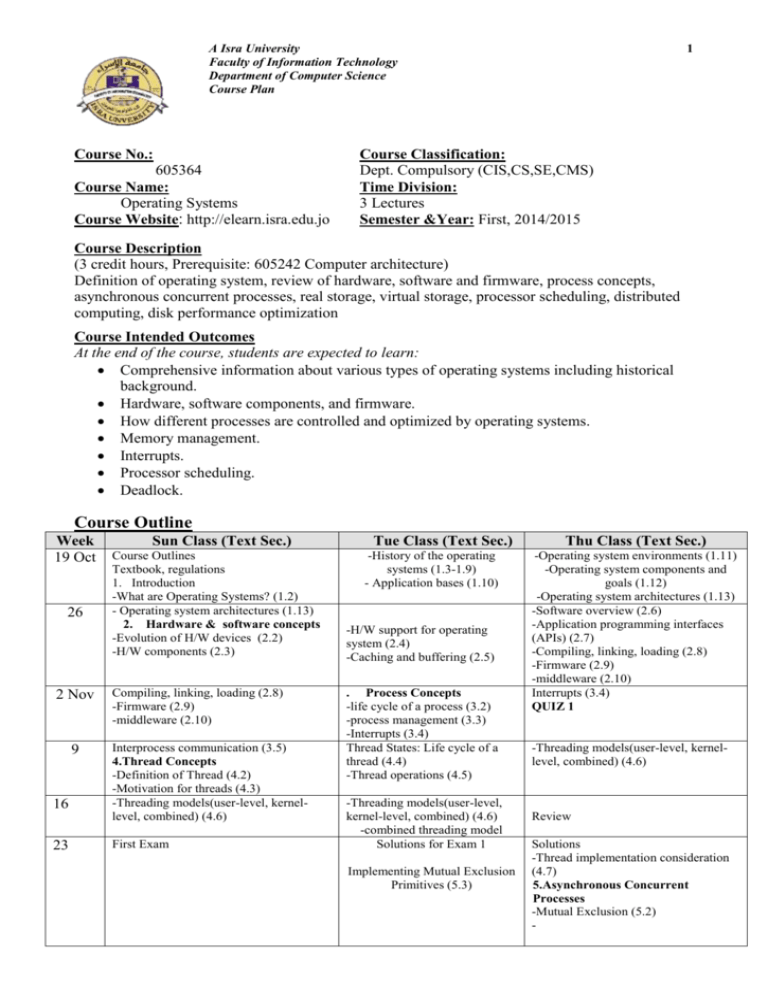
A Isra University Faculty of Information Technology Department of Computer Science Course Plan Course No.: 605364 Course Name: Operating Systems Course Website: http://elearn.isra.edu.jo 1 Course Classification: Dept. Compulsory (CIS,CS,SE,CMS) Time Division: 3 Lectures Semester &Year: First, 2014/2015 Course Description (3 credit hours, Prerequisite: 605242 Computer architecture) Definition of operating system, review of hardware, software and firmware, process concepts, asynchronous concurrent processes, real storage, virtual storage, processor scheduling, distributed computing, disk performance optimization Course Intended Outcomes At the end of the course, students are expected to learn: Comprehensive information about various types of operating systems including historical background. Hardware, software components, and firmware. How different processes are controlled and optimized by operating systems. Memory management. Interrupts. Processor scheduling. Deadlock. Course Outline Week 19 Oct 26 2 Nov 9 16 23 Sun Class (Text Sec.) Course Outlines Textbook, regulations 1. Introduction -What are Operating Systems? (1.2) - Operating system architectures (1.13) 2. Hardware & software concepts -Evolution of H/W devices (2.2) -H/W components (2.3) Compiling, linking, loading (2.8) -Firmware (2.9) -middleware (2.10) Interprocess communication (3.5) 4.Thread Concepts -Definition of Thread (4.2) -Motivation for threads (4.3) -Threading models(user-level, kernellevel, combined) (4.6) First Exam Tue Class (Text Sec.) -History of the operating systems (1.3-1.9) - Application bases (1.10) -H/W support for operating system (2.4) -Caching and buffering (2.5) . Process Concepts -life cycle of a process (3.2) -process management (3.3) -Interrupts (3.4) Thread States: Life cycle of a thread (4.4) -Thread operations (4.5) -Threading models(user-level, kernel-level, combined) (4.6) -combined threading model Solutions for Exam 1 Implementing Mutual Exclusion Primitives (5.3) Thu Class (Text Sec.) -Operating system environments (1.11) -Operating system components and goals (1.12) -Operating system architectures (1.13) -Software overview (2.6) -Application programming interfaces (APIs) (2.7) -Compiling, linking, loading (2.8) -Firmware (2.9) -middleware (2.10) Interrupts (3.4) QUIZ 1 -Threading models(user-level, kernellevel, combined) (4.6) Review Solutions -Thread implementation consideration (4.7) 5.Asynchronous Concurrent Processes -Mutual Exclusion (5.2) - A Isra University Faculty of Information Technology Department of Computer Science Course Plan 30 7 Dec 14 21 -Software solutions to the Mutual Exclusion5.4 -Hardware solutions to the Mutual Exclusion5.5 -Semaphores (5.6) postponement (7.3) Related problem: indefinite postponement (7.3) -Resource concepts (7.4) -Four necessary conditions for deadlock (7.5) New Year -Deadline Scheduling (8.8) -Real-time (8.9) Solutions Review 8. Real Memory Organization and Management -Storage organization, Storage Management, Storage Hierarchy, Storage Management Strategies (9.2-9.5) -Deadlock (solutions, prevention, avoidance, detection, recovery, strategies) (7.6-7.11) 7.Processor Scheduling -Scheduling Levels (8.2) -Preemptive vs. Non-preemptive Scheduling (8.3) -Priorities (8.4) -Scheduling Objectives (8.5) -Scheduling Criteria (8.6) -Scheduling algorithms (8.7) Second Exam -Variable Partition Multiprogramming (9.9) -Multiprogramming with Storage Swapping (9.10) QUIZ 2 9. Virtual Memory Organization -virtual memory: basic concepts (10.2) -block mapping (10.3) -block mapping (10.3) -paging (10.4) -segmentation (10.5) 4 Jan segmentation paging system (10.6) 10. Virtual Memory Management -Locality (11.2) -Page Release (11.9) - Page Size (11.10) -Program Behavior under -Page Replacement (11.5) -Page replacement strategies (11.6) Paging (11.11) -Global vs. local replacement (11.12) -Why scheduling is necessary (12.4) -Disk scheduling strategies (12.5) -Disk scheduling strategies (12.5) -Rotational optimization (12.6) -System Considerations (12.7) 18 6. Deadlock and indefinite postponement -Examples of deadlock (7.2) -Related problem: indefinite -Contiguous vs. Noncontiguous Storage Allocation, Single User Contiguous Storage Allocation (9.6-9.7) 28 11 2 -Working set model (11.7) -Page Fault Frequency (11.8) 11. Disk Performance Optimization -Evolution of secondary storage (12.2) -Characteristic of Moving-Head Disk Storage (12.3) -Caching and buffering (12.8) -Other disk performance techniques (12.9) 25 Final Exam 1 Feb Textbook 1. An Introduction to Operating Systems Harvey M. Deitel 3rd Edition Addison-Wesley Publishing Company 2004. 2. William Stallings “Operating systems, internals and design principles” , 7th ed., PrenticeHall, 2011 Suggested references 1. Silbeschatz, Galvin and Gange; "Operating Systems Concepts"; 6th ed. John-Weley & Sons; 2002. 2. Modern Operating Systems Andrews Tanenbaum Prentice Hall International Editions,2003 Marking First Exam Second Exam 25 marks 25 marks A Isra University Faculty of Information Technology Department of Computer Science Course Plan Activity Final Exam 3 10 marks (Quizzes, Assignments: Report+ possible programs) 40 marks Regulations 1. 2. 3. 4. 5. There will be three term exams given during this semester. The best two out of three will be considered for the First and Second Exam. This means: there will be NO makeup exams! Missing one of the two left exams means a ZERO grade will be given for that exam. There are no makeup for quizzes Attendance is mandatory and University regulations will be enforced. All Cheating incidents will be reported to the chair. The following activities are considered cheating: a. Turning in assignment that includes parts of someone else's work. b. Turning in someone else’s assignment as your own. c. Giving assignment to someone else to turn in as their own. d. Copying answers in a test or quiz. e. Taking a test or quiz for someone else. f. Having someone else take a test or quiz for you. See Student handbook for other regulations. Assignments and/or Projects Students are expected to do assignments (Quizzes and Homework) as depicted in the following Table: Assignments / Description Due Date Marking Projects See the outline above Quizzes Homework 2 Quizzes Further readings Deadlines will be announced 6 Marks 4 Marks Emailing Guidelines: 1. 2. 3. 4. All homework, assignments, projects, etc., are sent by email to the email address shown below (under Instructor’s Information). Be sure to send them before the due date. Fill in the subject field of the email using the following format: CS242_Family-Name_First-Name_Subject , where: a) CS242 is abbreviation for the course. Other courses should have similar abbreviations b) Family-Name and First-Name are replaced by your family name and your first name. c) Subject is replaced by the title of the assignment, project, etc. You may also use the email to ask questions about the course. In this case, just type the world “question” in the place of _Subject as described in 3-c above. Instructors' information Section: 1 Lecture Room : 4140 Time: 12-1 (Sun, Tue, Thu) Instructor's Name: Dr. Intisar Al-Shummari Office No.: 4109 Email : intisar.alsayed@iu.edu.jo Office Hours: [10-11] Sun, Tue, Thur [10-11] Mon, Wed Other office hours are available by appointment Instructor Dr.Intisar Al Shummari Council Chair


